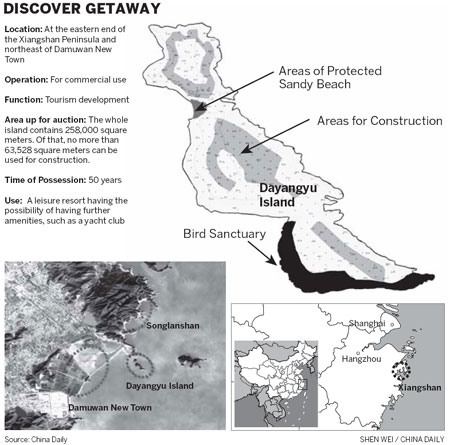$3m bid wins 1st island sale
Updated: 2011-11-12 10:28
By Shi Yingying (China Daily)
|
|||||||||
|
Yang Weihua, general manager of Ningbo Gaobao Investment, makes the winning bid for the right to lease Dayangyu Island, which lies off the coast of Ningbo, Zhejiang province. [Photo / China Daily] |
NINGBO, Zhejiang - Da-yangyu, the first island ever to be put up for auction in China, sold for 20 million yuan ($3.15 million) on Friday.
Ningbo Gaobao Investment, which deals in real estate and tourism development, won a three-way bidding war for the right to use the land for 50 years and build a luxury resort.
"I think 20 million yuan is a reasonable price," said Yang Weihua, general manager of Ningbo Gaobao. "It has rich natural resources, especially in vegetation and seafood, and it's a great spot for sailing on the big, blue sea."
She said her company will invest about 500 million yuan into the project, but declined to reveal more details.
Dayangyu Island, which lies off the coast of Ningbo in Zhejiang province, covers 258,000 square meters - the size of 36 soccer fields - and was once an orchard and hunting site.
It is among the first batch of 176 uninhabited islands made available to domestic and foreign developers by the State Oceanic Administration.
"Located between urban areas and scenic attractions, Dayangyu is one of the islands with relatively good resources," said Jin Tengyong at the Xiangshan county ocean and fisheries bureau, explaining the 15-million-yuan reserve price at auction.
"It's just 300 meters off the mainland, meaning the island is more suitable for reclamation if you take into account the cost of infrastructure, such as fresh water, electricity and roads."
Authorities running the auction invited only companies with registered capital of more than 50 million to take part. The losing bidders were Xiangshan Tourism Group and Xiangshan Movie Development.
"Setting the bottom line high is beneficial for the island's future," said Jin, who added that the local government will not cover the cost of infrastructure.
As this was the first auction of an island in China, the event was nerve-wracking for both officials and experts at Huacheng Auction House, which organized the sale.
"It was a trial for all of us," said the auctioneer, Li Lianmei. "The authorities were worried they couldn't do the auction professionally and there was concern we wouldn't even be able to find three potential buyers in advance.
"In the end, we just carried it out as we do all land use sales," she added.
According to the country's Island Protection Law, which took effect in March 2010, individuals and companies can only use the islands for up to 50 years after obtaining approval from local governments and ecologists.
Getting that permission, however, does not mean developers have the freedom to do whatever they want.
"I received a phone call from an interested party one day who was asking about turning an island into a industrial base," said Jin. "I turned him down immediately."
Zhejiang has about 2,900 islands, each with an area of 500 to 1,000 square meters. More than 90 percent are uninhabited.
Although the State Oceanic Administration's decision to open Chinese islands to developers stoked excitement, few local governments have so far been able to seal deals.
"We've had 10 islands on the market since April, but not a single one has been leased out," said Ni Dingkang, an ocean and fisheries official in Zhoushan, the only prefecture-level city in China made up entirely of islands.
"The reason is mainly due to the high rent and poor condition of these islands."













